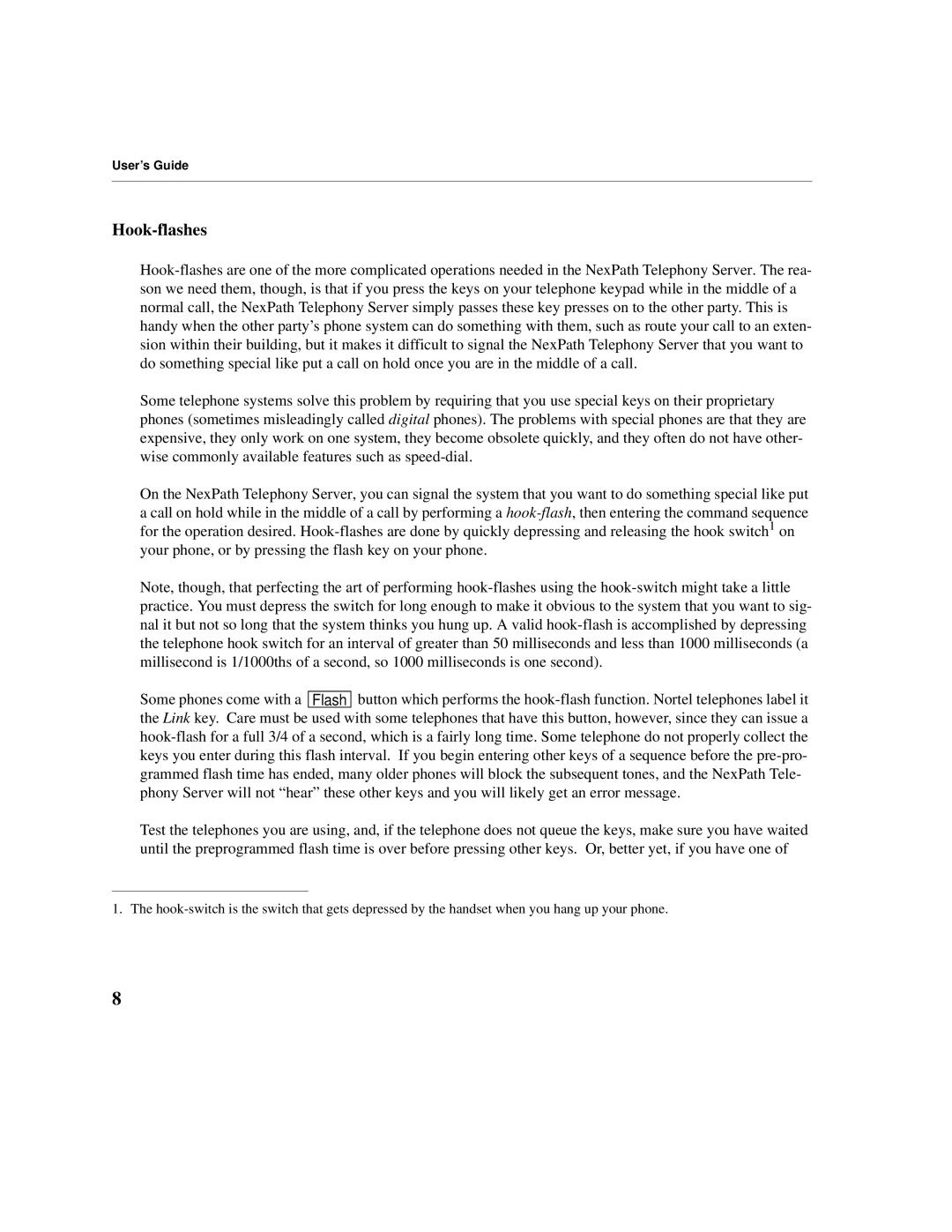Hook-flashes
Hook-flashes are one of the more complicated operations needed in the NexPath Telephony Server. The rea- son we need them, though, is that if you press the keys on your telephone keypad while in the middle of a normal call, the NexPath Telephony Server simply passes these key presses on to the other party. This is handy when the other party’s phone system can do something with them, such as route your call to an exten- sion within their building, but it makes it difficult to signal the NexPath Telephony Server that you want to do something special like put a call on hold once you are in the middle of a call.
Some telephone systems solve this problem by requiring that you use special keys on their proprietary phones (sometimes misleadingly called digital phones). The problems with special phones are that they are expensive, they only work on one system, they become obsolete quickly, and they often do not have other- wise commonly available features such as speed-dial.
On the NexPath Telephony Server, you can signal the system that you want to do something special like put a call on hold while in the middle of a call by performing a hook-flash, then entering the command sequence for the operation desired. Hook-flashes are done by quickly depressing and releasing the hook switch1 on your phone, or by pressing the flash key on your phone.
Note, though, that perfecting the art of performing hook-flashes using the hook-switch might take a little practice. You must depress the switch for long enough to make it obvious to the system that you want to sig- nal it but not so long that the system thinks you hung up. A valid hook-flash is accomplished by depressing the telephone hook switch for an interval of greater than 50 milliseconds and less than 1000 milliseconds (a millisecond is 1/1000ths of a second, so 1000 milliseconds is one second).
Some phones come with a 
 Flash
Flash 
 button which performs the hook-flash function. Nortel telephones label it the Link key. Care must be used with some telephones that have this button, however, since they can issue a hook-flash for a full 3/4 of a second, which is a fairly long time. Some telephone do not properly collect the keys you enter during this flash interval. If you begin entering other keys of a sequence before the pre-pro- grammed flash time has ended, many older phones will block the subsequent tones, and the NexPath Tele- phony Server will not “hear” these other keys and you will likely get an error message.
button which performs the hook-flash function. Nortel telephones label it the Link key. Care must be used with some telephones that have this button, however, since they can issue a hook-flash for a full 3/4 of a second, which is a fairly long time. Some telephone do not properly collect the keys you enter during this flash interval. If you begin entering other keys of a sequence before the pre-pro- grammed flash time has ended, many older phones will block the subsequent tones, and the NexPath Tele- phony Server will not “hear” these other keys and you will likely get an error message.
Test the telephones you are using, and, if the telephone does not queue the keys, make sure you have waited until the preprogrammed flash time is over before pressing other keys. Or, better yet, if you have one of
1. The hook-switch is the switch that gets depressed by the handset when you hang up your phone.

![]()
![]() Flash
Flash ![]()
![]() button which performs the
button which performs the 